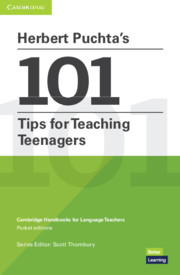 Herbert Puchta's 101 Tips for Teaching Teenagers
Herbert Puchta's 101 Tips for Teaching Teenagers Book contents
G - Writing
Published online by Cambridge University Press: 28 October 2023
Summary
Learners who can express themselves effectively in writing in a new language often have a clear sense of ownership of it. But in many teenage classrooms, this is an idea that has yet to be explored, especially when writing is seen merely as a way of taking notes for exam preparation, or as a way of practising a new language in the form of grammar activities and drills. So this section focuses on some swift and practical ways of getting learners to write short functional texts, then suggests various ways of involving learners in fun and poetic writing tasks, and rounds off with ideas on how to use ‘mentor sentences’: literary models of excellence aimed at enriching the learners’ own writing styles.
73 Involve learners in writing short texts
74 Help learners get into a writing flow
75 Text transformations
76 Engage learners in silent dialogue writing
77 Use grammar poetry to make language more memorable
78 Mini-sagas
79 Write questions for an interview
80 Wacky lists
81 Use mentor sentences to inspire your learners’ writing
82 Ask learners to write an eyewitness account
73 Involve learners in writing short texts
Writing can be frustrating for beginners and for those who are struggling. So teaching them how to write short, meaningful texts can give learners a terrific sense of achievement.
Teenagers should be taught right from the start to write short texts with a communicative purpose:
• Short emails: Emails are easy to write. They can be short and informal. Write emails to ask your learners simple questions that they answer as homework. Teach them to send you emails, too.
• Writing memos: Show learners what the format of a memo looks like (To: / From: / Date: / Subject:). Show learners how to write memos to each other, e.g. when doing a group project.
• Writing a personal note: Write short messages to your learners to congratulate them on an achievement, to thank them for something, etc. Encourage them to write notes to each other, too.
Higher-level learners need to practise writing shorter texts, too – in their work life they will be expected to write concisely and clearly.
• Teach learners how to write customer feedback messages after buying something online or eating at a restaurant. A text they can publish immediately!
– Show learners examples of customer feedback messages – for example, on restaurants’ homepages or websites for travellers.
- Type
- Chapter
- Information
- Herbert Puchta's 101 Tips for Teaching TeenagersCambridge Handbooks for Language Teachers Pocket editions, pp. 79 - 89Publisher: Cambridge University PressPrint publication year: 2020


